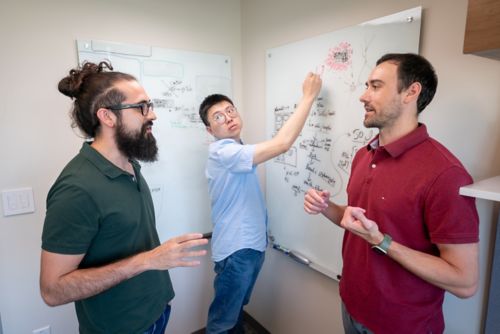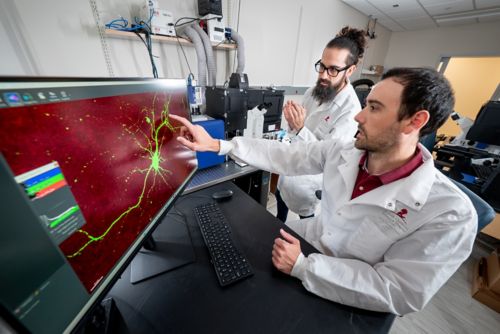St. Jude Family of Websites
Explore our cutting edge research, world-class patient care, career opportunities and more.
St. Jude Children's Research Hospital Home

- Fundraising
St. Jude Family of Websites
Explore our cutting edge research, world-class patient care, career opportunities and more.
St. Jude Children's Research Hospital Home

- Fundraising
Fernando C. Alsina Lab
Investigating how RNA and cytoskeletal regulation dictate neural differentiation during brain development and disease.
Overview

Neural development is a tightly regulated process that begins in an embryo and continues throughout the early postnatal lifetime of the organism. As the brain develops, neural cells go through a series of developmental stages determined by key molecular and cellular mechanisms. This ensures neurons form diverse neural circuits that enable brain function. Neurons are lifelong cells which have complex morphologies with lengthy projections called axons and dendrites that can extend to several centimeters or over a meter. As a result, precise regulation of cellular components such as RNA and cytoskeleton are particularly critical for neurons. Aberrations in these mechanisms can cause neurodevelopmental and neurodegenerative diseases. Our lab is interested in identifying the molecular underpinnings by which neural cells differentiate, grow and mature to form complex neuronal circuits, with a focus on RNA and cytoskeletal regulation. Our findings provide useful insights to help identify molecular drivers of neurodevelopmental diseases.
Our research summary
Neural development
The human brain contains billions of neurons, and trillions of connections between them. Neurons have distinct anatomy with axons, dendrites and synapses, which modulate how these cells process information and the subsequent neural networks they build. Neuronal architecture and function is accomplished by a highly regulated developmental process that includes many factors such as external cues, gene expression, post-transcriptional control and cytoskeleton organization. Our lab is particularly interested in how RNA metabolism and cytoskeletal dynamics impact the process of brain development.

mRNA metabolism
The regulation of messenger RNA (mRNA) metabolism is critical for neural development. The way mRNA is spliced, transported, localized, translated and eliminated modulates neuronal morphology, diversity and function. Our lab is focused on the study of RNA-binding proteins (RBPs) and how those regulate RNA metabolism and neural development. There are over 1,500 RBPs encoded in the human genome many of which, when mutated, have been linked to neurodevelopmental diseases. One of these RBPs – an RNA helicase called EIF4A3 – is the central component of the exon junction complex (EJC), and mutations in its encoding gene cause a rare developmental disorder known as Richieri-Costa-Pereira syndrome. Our work uncovered a new mechanism by which EIF4A3 directly binds microtubules and regulate their dynamics, influencing neuronal growth and brain development. Thus, EIF4A3 is part of an emerging class of proteins that can bind both RNA and microtubules, opening unexplored ways to control cell behavior.
Cytoskeletal organization and neurodevelopmental disorders
The neuronal cytoskeleton generates the structural frame of axons, dendrites and synapses. Built of microtubules, actin and neurofilaments, the cytoskeleton is required for neuronal function and defects in cytoskeletal organization have been associated with neurodevelopmental and neurodegenerative diseases. Our work, showing EIF4A3 functioning as a microtubule-associated protein, highlights the multifunctionality of RBPs in brain development, and sheds light on previously overlooked layers of cytoskeletal regulation. The Alsina lab is focused on understanding the full landscape of proteins that bind and regulate microtubules throughout neural differentiation and how this is altered in neurodevelopmental disorders such as tubulinopathies.
Lab experimental approach
Our team uses model systems, including human brain organoids, cell culture, microscopy, live-cell imaging, transcriptomics, proteomics and molecular and biochemical assays to identify the factors critical for brain development and those which are altered in neurodevelopmental diseases.

Publications
Contact us
Fernando C. Alsina, PhD
Assistant Member, St. Jude Faculty
Department of Cell and Molecular Biology
MS 326, M3420
St. Jude Children’s Research Hospital

Memphis, TN, 38105-3678 USA GET DIRECTIONS